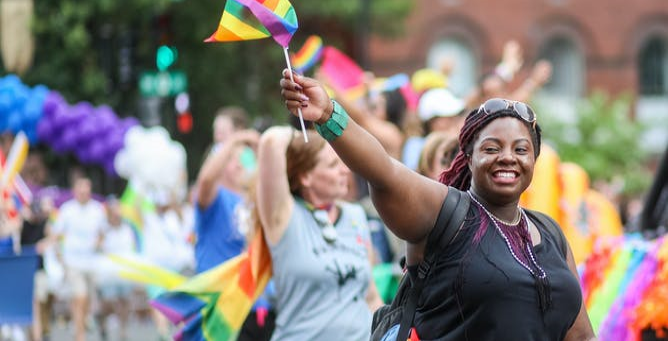Finding competent and affirming mental health support can be challenging for black transgender people
- Written by Kathryn Stinson, LPC

June is typically the time for Pride celebrations all over the world, marking the anniversary of the Stonewall Riots, which were widely regarded as a turning point in the fight for LGBT rights. In June 2020, Pride celebrations have been hampered by COVID-19, but after the deaths of Dominique Fells, Riah Milton, and Tony McDade, Black Trans Lives Matter demonstrations are making news nationwide.
The 1969 Stonewall riots were started by a black transgender woman named Martha P. Johnson. Yet even as the LGBTQIA+ community has gained ground in terms of rights and acceptance, black transgender people have not reaped the benefits equally. Black transgender people report higher rates of discrimination, harassment, unemployment, and poverty than white LGBT people. The Human Rights Campaign, which tracks violence against transgender individuals, reported than in 2018 and 2019, more than half of all transgender people killed in the US were black transgender women.
We know that the experience of discrimination, harassment, and threats of violence leaves people more vulnerable to depression, anxiety substance abuse, and many other mental health concerns. Yet black transgender people may be less likely to reach out to doctors and mental health professionals. It’s not difficult to understand why. Historically, many minority communities have had, at best, substandard care, and at worst, they have been subjected to unethical experimentation. The infamous Tuskegee study, in which black men were systematically mistreated and lied to by medical researchers, had lasting, intergenerational effects on the health and wellbeing of black men and their families. LGBTQIA+ folks have long been subjected to harmful “conversion” therapies, some going so far as to include physically harmful and traumatic aversive experiences. Even in 2020, when such practices are far less prevalent, many black and transgender people report experiencing microaggressions at the hands of health and mental health professionals, and many find they have to educate their providers before they can hope to receive proper care.
Given these realities, it can be exceedingly difficult for black transgender people to find mental health professionals who are competent and affirming, and seeking help often feels far more daunting than it should have to be.
Fortunately, there are organizations working to address the disparities and provide services:
The Trevor Project (www.thetrevorproject.org) provides training for mental health professionals as well as resources for black, transgender youth. Crisis counseling is available via phone and text, 24/7.
The National Queer and Trans Therapists of Color Network (www.nqttcn.com) is a growing list of non-white queer and trans therapists across the country.
The St. Louis Metro Trans Umbrella Group (www.stlmetrotrans.org) is working tirelessly to meet as many needs of the local gender non-conforming community as possible, with a food pantry, support groups, social events, and a comprehensive list of trans-competent doctors, therapists, and other providers throughout the area.
The Transgender Law Center (www.transgenderlawcenter.org) has multiple programs aimed at helping black transgender people deal with the effects of oppression-based trauma and gain access to appropriate and inclusive services.
We can hope that there comes a time, in the not too distant future, when we do not need to be reminded that Black Trans Lives Matter. Mental health professionals have a significant role to play in making sure that day comes sooner rather than later.
About the Author
 Kathryn Stinson, LPC is a therapist with a private practice in Maplewood, MO, where she specializes in Narrative Therapy with LGBTQIA+ people, creators, activists, and those in unconventional relationships.
Kathryn Stinson, LPC is a therapist with a private practice in Maplewood, MO, where she specializes in Narrative Therapy with LGBTQIA+ people, creators, activists, and those in unconventional relationships.






















